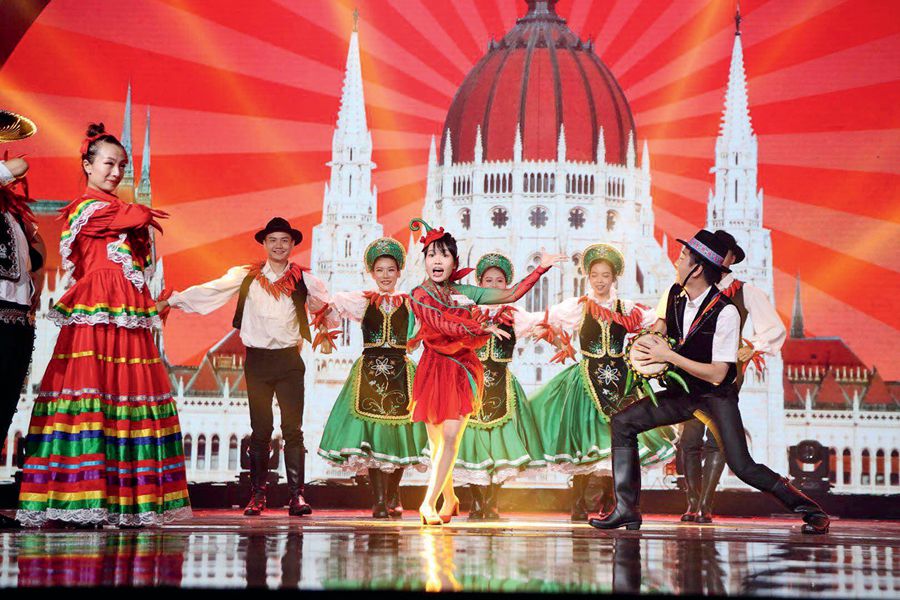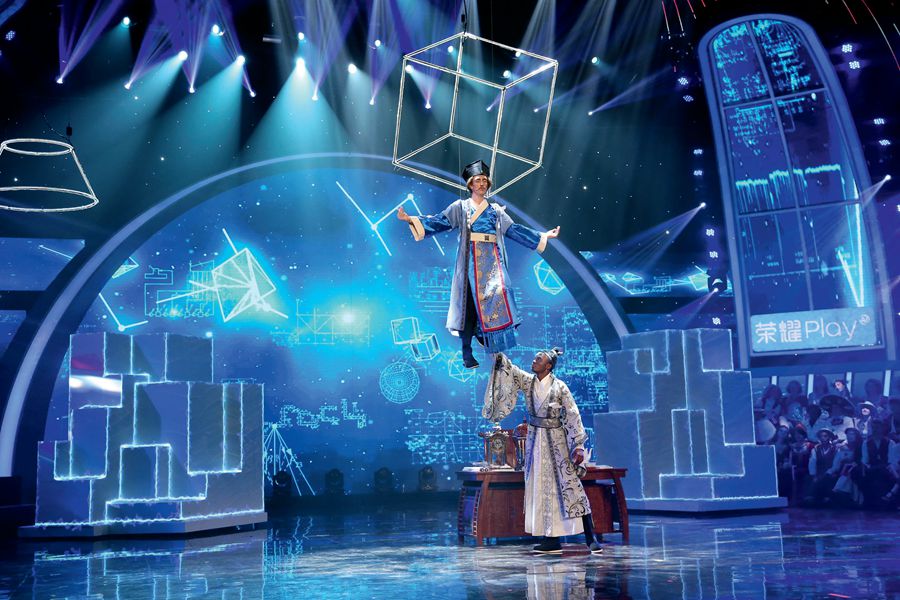THE limits of my language mean the limits of my world.” These words originate from the famous Austrian-British linguistic philosopher Ludwig Wittgenstein (1889-1951).
Learning a new language means not only acquiring linguistic rules and new vocabulary, but also sending your mind on an exciting journey into the unknown, during which you immerse yourself in a foreign culture and come in contact with new people, their habits, and everyday customs.
From July to August, participants of the 17th Chinese Proficiency Competition for Foreign College Students, also known as the Chinese Bridge contest, set off on just such an adventurous journey.
Throughout eight competitve rounds, the 152 participants from 118 countries demonstrated their Chinese skills in the metropolis of Changsha in Hunan Province, and fought for a place in the grand final on August 4.
Game Show Entertainment
But if you are imagining sterile classrooms, test sheets, and a dull exam atmosphere when you think of such a language competition, you are mistaken!
For several years now, China’s Office of Chinese Language Council (Hanban), the umbrella organization of the Confucius Institutes around the world and as such the organizer of the yearly Chinese Bridge contest, has been cooperating closely with Hunan Television in organizing the event. And Hunan TV is a well-known brand in China’s TV entertainment landscape. The station produces such popular programs such as “I am a Singer” and most recently the innovative music video live show called, “PHANTACITY.”

Impressed with the performance of the candidates: The jury members (from left to right) Zhang Weiwei (Fudan University), Hai Xia (China Media Group) and Herbert Mushangwe (Confucius Institute Zimbabwe).
Since Hunan TV got on board, as a result of the organizers producing the language competition as a colorful casting show for the TV stage, it has become clear that learning Chinese can be really hip!
The five contestants who finally made it onto this stage as representatives of their respective continents were Vivi from Indonesia (for Asia), Anthony Ekwensi from Nigeria (Africa), Ruslan Ustinov from Russia (Europe), John Klumpp from the U.S. (America), and Theodore Stapleton from Australia (Oceania). From their ranks, the final Chinese Champion 2018 was chosen in an impressively choreographed TV finale.
The students shared the stage with big names of Chinese showbiz, such as the famous presenter Wang Han and CCTV news anchor Ouyang Xiadan, two of China’s most popular TV hosts.
Between the three competition rounds, in which the five finalists had to prove their knowledge of language and culture as well as their performance and self-marketing skills, performances by the popular singer Tengri from Inner Mongolia and a duet by the Kazakh girl, Dimash Kudaibergen with the Chinese singer Tia Ray were interwoven into the program. It was another proof of how the organizers cleverly managed to celebrate the language contest as glamorous entertainment on a grand scale.

Adding more flavor to the event: Finalist Vivi from Indonesia performs a musical number dressed as a chili.
No doubt though, this TV spectacle certainly does justice to the importance of the Chinese language. After all, Mandarin is by far the most spoken language in the world. The fact that the number of learners has continued to rise in recent years is also due to Hanban’s commitment. By the end of 2017, the Chinese cultural organization was represented in 146 countries and regions around the globe with a total of 525 Confucius Institutes and 1,113 Confucius classrooms.
Nevertheless, as a character-based tonal language, Chinese still has the reputation of being one of the most difficult languages to learn in the world, which deters some learners from even starting. It is true, for instance, that you need to master around 3,000 Chinese characters (Hanzi) in order to be able to read a Chinese news text to begin with.
Is Chinese Really That Difficult?
That’s what we wanted to know from the finalist Ruslan Ustinov from Russia. “It definitely is,” said the 19-year-old, who represented Europe in this year’s competition.
The pronunciation is especially challenging, the young Russian, whose hometown is only a few hours by car from the Chinese border, admits. Ustinov first came in contact with the Chinese language at the age of six, and since fifth grade he regularly received Chinese lessons.
“I worked as a travel guide for Chinese tourists in my spare time for a while. But I guess nobody really understood me when I gave my first tour,” he says and laughs.

Proof of acting talent: The finalists Theodore Stapleton (left) and Anthony Ekwensi play an encounter between the Italian missionary Matteo Ricci and the Chinese scholar Xu Guangqi during the Ming Dynasty.
Anthony Ekwensi, aged 21, from Nigeria has only been learning Chinese for two years. For him, Chinese characters are his greatest challenge. However, besides his love for Chinese kung fu movies, it was the Hanzi that really aroused his curiosity for Chinese in the first place. He says: “Back then I wondered how the Chinese could read these signs.”
Now Ekwensi has solved this mystery for himself, but he realized that a lot of practice is necessary to make continuous progress. “My simple secret to master the Chinese language is to practice every day,” he reveals.
John Klumpp, 22, from the United States, has also only been learning Putonghua, as the standardized form of Chinese is also called, since the end of 2015. For him, listening comprehension and the cultural context are the biggest hurdles.
He says, “On the one hand, there are different types of dialects in China; on the other hand, different expressions are often used for different situations and on different occasions. This is sometimes quite confusing for us as foreign learners.”
The final jury, consisting of the CCTV presenter Hai Xia, director of the China Institute at Shanghai-based Fudan University Zhang Weiwei, as well as Herbert Mushangwe, the foreign director of the Confucius Institute Zimbabwe, was highly satisfied with the stage performance of the students in the final competition.
One of the show highlights definitely was the cheeky singing and dancing performance of the Indonesian contestant Vivi, who represents Asia. In a chili-pepper costume framed by a group of colorful dancers and acrobats she warmed up the audience with cute Chinese lyrics, and received resounding applause.
All Are Winners
In the final round, 19-year-old Ustinov prevailed with his youthful charm and accent-free Mandarin. He was closely followed by 22-year-old Theodore Stapleton from Perth, Australia, who, in his hipster look with half-length curls and fine trimmed moustache, came second. However, in the end under the final confetti-shower all contestants were winners.

Winner’s smile: In the end, 19-year-old Ruslan Ustinov secures the title.
The question that inevitably arises in the end is: Why should someone put themselves through so much learning turmoil to master Mandarin? In retrospect, did the great effort exerted in learning this foreign language pay off for the participants?
“Absolutely!” Says the Nigerian finalist and kung fu fan Ekwensi, whom the contest brought to China for the first time. “Chinese changed my life,” he says. For him, the new language has primarily opened up professional prospects.
According to Klumpp, learning Chinese also contributed to his personal development. “Through the Chinese Bridge competition, I did not only get to know people from all over the world, but have also become more self-confident and overcame my stage fright,” he explains.
Vice-champ Stapleton is happy that Chinese has brought him in contact with Far Eastern philosophy, he said, “In my first year at the Chinese university, I read many books on Zen Buddhism. In the last year I even spent a month in a Chinese temple.”
Tips from a Mandarin Champ
For all those who would like to get a good command of Chinese at some point, we have elicited the secret tips from the finalists.
Winner Ustinov says, “My advice is to talk to Chinese people right from the start. After all, you don’t just want to write things in a language, you want to really communicate with people.” American Klumpp recommends, “Take care of your pronunciation and the tones from the beginning!” And Anthony Ekwensi’s credo is: practice, practice, and more practice.
In the end, it is not only vocabulary and grammar, but the impact which the language has on the learner. “Chinese has brought me into contact with a completely different way of thinking. Now, I often see things from a different perspective,” says finalist Ruslan Ustinov.
Theodore Stapleton adds, “The only way to find out what you have learned from your own culture is to immerse yourself in another one. As far as Chinese is concerned, I’m certainly still at the beginning of this process and still have a long way to go before I understand everything, but I think, I’m on the right track.”
The postulate of Wittgenstein mentioned at the beginning of this article was right after all, as the horizon of the participants has indeed been broadened by their study of Chinese.
So the bridge has been built, but the actual journey, however, has only just begun.



